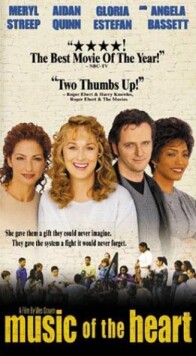Read My Lips (Sur Mes Lèvres)
Sur Mes Lèvres (Read My Lips), directed by Jacques Audiard is a typically French but quite watchable exploration of the redemptive powers of crime. Carla (Emmanuelle Devos) is the partially deaf secretary/receptionist at a Parisian construction company where her hard work has led to her being given more and more responsibility. All the same, her fellow employees (all men) continue to regard her with a casual contempt — symbolized by their habit of putting on her desk their half-drunk coffee cups, which are then easily upset. Their attitude is owing partly to the fact that she is a woman in a man’s world, partly to her deafness and the fact that she has to use big clunky hearing aids on both ears to do her job of answering the phones and partly to her alleged unattractiveness.
This, as is usual in the movies, is something of a problem because even though Mlle. Devos does her best to uglify herself, she can scarcely hide the fact that she is very attractive indeed. Therefore the whispers of her fellow employees about what a “dog” she is — whispers to which she is able to attend because of her ability to read lips — border on the incomprehensible. Yet they, and her reaction to them, are essential elements of the story, not only because they provide the foundation for an original and unique case of paranoia — most paranoids can only imagine what everyone is saying about them; Carla can see it — but also because they form the basis of her bond with her fellow-outsider, Paul (Vincent Cassel), an ex-convict whom she hires as her assistant.
Carla knows that she has gone out on a limb to hire Paul, but shy and (supposedly) unattractive as she is, she is immediately attracted to him — and presumably to the dangerous air of criminality that acts upon Frenchwomen, at least the ones in the movies, like catnip to a cat. Paul at first is determined to go straight and stay out of prison, but the obligations he has incurred in his former life keep coming back to haunt him. And soon he realizes that he is incurring new obligations in his outwardly legitimate life, most notably to Carla who calls him to a most surprising reckoning.
One of the best scenes in the film comes when, having hired him in spite of his complete incapacity for office work, she takes him to an as yet unfinished apartment where he can live rent-free for five or six months and gives him an advance on his salary. Paul, hard used by the world, can cope with anything but kindness, and he awkwardly tries to approach her sexually — whereupon she runs, sobbing, to hide in a closet. Paul, who is not really attracted to her, is merely bewildered. “Isn’t that what you wanted?” he asks. “Job, apartment, money,” he says, listing the favors she has done him. “What do you want?”
The beauty of the scene is that she does want it, though of course not as payment for services rendered. But she can also see the way in which she must approach someone who has lived all his life in a world where no one gets anything for nothing. She learns fast. Accordingly, she tells him the next day that she understands why he did what he did. He had felt himself under an increasing weight of obligation to her and felt the need to “pay with what you can. I understand,” she reiterates. And then, after a pause: “But you do owe me.” It is then Carla who lures him back into the life of a criminal by blackmailing him into helping her to get her revenge on the worst of her persecutors at work.
One of the themes of the film are the bonds between people that are other than sexual, or that become a substitute for the sexual. A subplot involves Paul’s parole officer, Masson (Olivier Perrier), a man whose wife has gone missing and who, as he encourages Paul in the ways of respectable, workaday society, is gradually revealed to be himself in the process of moral and intellectual disintegration. Though we are given no details of what went on in his 35-year marriage, it is clear that something in the nature of the bond between him and his wife, who never appears, has in some way broken him irretrievably.
To pay off an old debt, Paul has to go to work in the evenings as a bartender at a shady establishment run by the thuggish Marchand (Olivier Gourmet). He is almost relieved that this setback seems to promise escape from the office job. But he sees that Marchand and some thieves he knew on the inside are up to some mischief that might provide an opportunity for himself. Again he seems to approach Carla romantically, only to reveal that he wants her to observe the thieves through binoculars and read their lips. Gradually she is drawn into his world as he has been drawn into hers. His demands on her grow greater and greater until she threatens to stop. “I’m not a fax machine,” she says, using the imagery of her more familiar life to him. “Why should I freeze on a roof spying on hoodlums?”
Paul is again the prisoner of his prison mentality and tells her that the reason is money, of course. He is going to cut her in on the big score. But she is not interested in money. Once again he is driven to ask: “What do you want?”
Unlike him, we have seen the evidence of her sexual attraction to him, and again the pause is pregnant with expectation. Then she answers: “Come to work like before.” It is the intimacy of the office, where he is her one intimacy and the only one she can feel superior to, that she craves, if only because she believes deep down inside that she can expect nothing better. “Take it or leave it,” she says.
And so they begin a period of some days or weeks spying on the hoodlums at night and working in the office as usual during the day. The dividing line between bourgeois respectability and the criminal underworld begins to blur, and the intimacy between them naturally increases. One day, as Carla is sitting in on a meeting of the company bigwigs who are expressing frustration about a roadblock that a local official has thrown up to one of their biggest projects, she speaks up for perhaps for the first time in such a meeting. She believes that the problems with this man are psychological, she says, and that they aren’t going at the right way to surmount them. Why not let her see what she can do? The surprised executives agree, and we cut to Paul and another thug knocking on the official’s door and beating him up.
Clever and amusing as all this is, if you disregard the political implications (isn’t the businessman, after all, just une espèce de criminel?), I don’t think that the dénouement, though tightly plotted and skillfully put together on the screen, rings true. The conceit of self-realization through criminality is too cinematic and literary to work on the realistic level it is supposed to work on here. Without giving too much away, I hope I can say that Carla’s willingness to put herself in danger for Paul and his schemes is believable only up to a point. If she had been carried away on the ecstasy of mere transgressiveness — as I take it we are meant to suppose she has been — she is still too much the prim little secretary not to draw the line at the point where Paul’s harebrained scheme to retrieve a hopeless situation he has got himself into by sheer stupidity requires help from her that is quite likely to cost her her life. But then, if you’re French, maybe you don’t mind dying if it means you get to make such a splendidly existential statement of the moral nullity at the heart of things.
Discover more from James Bowman
Subscribe to get the latest posts to your email.







